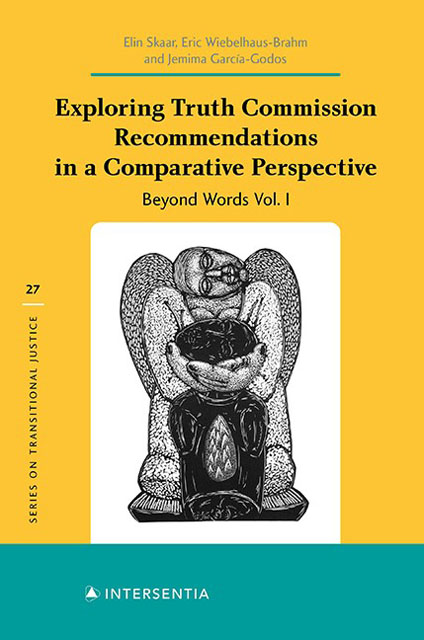Book contents
- Frontmatter
- Preface
- Contents
- List of Acronyms and Abbreviations
- List of Tables and Figures
- Chapter 1 Exploring Recommendations
- Chapter 2 Researching Recommendations
- Chapter 3 Counting and Classifying Recommendations
- Chapter 4 Formulating Recommendations
- Chapter 5 Case Studies of Implementation
- Chapter 6 A Cross-National Analysis of Implementation
- Chapter 7 Conclusions
- Appendix I Latin American truth Commission Reports
- Appendix II Information on 13 Latin American truth CommissionReports and their Recommendations
- Appendix III Excerpts from the truth Commission Recommendations Data Code Book
- Appendix IV Implementation of the Recommendations Made by 13 Latin American truth Commissions
- Appendix V Implementation Rates for Recommendations Made by 13 Latin American truth Commissions, by Category
- Appendix VI Overview of Commissioners of 12 Formal Latin American truth Commissions
- Appendix VII Latin American Countries Signatories to and Ratification of the International Convention for the Protection of All Persons from Enforced Disappearance (2006)
- Bibliography
- Index
- About the Authors
Chapter 3 - Counting and Classifying Recommendations
Published online by Cambridge University Press: 19 November 2022
- Frontmatter
- Preface
- Contents
- List of Acronyms and Abbreviations
- List of Tables and Figures
- Chapter 1 Exploring Recommendations
- Chapter 2 Researching Recommendations
- Chapter 3 Counting and Classifying Recommendations
- Chapter 4 Formulating Recommendations
- Chapter 5 Case Studies of Implementation
- Chapter 6 A Cross-National Analysis of Implementation
- Chapter 7 Conclusions
- Appendix I Latin American truth Commission Reports
- Appendix II Information on 13 Latin American truth CommissionReports and their Recommendations
- Appendix III Excerpts from the truth Commission Recommendations Data Code Book
- Appendix IV Implementation of the Recommendations Made by 13 Latin American truth Commissions
- Appendix V Implementation Rates for Recommendations Made by 13 Latin American truth Commissions, by Category
- Appendix VI Overview of Commissioners of 12 Formal Latin American truth Commissions
- Appendix VII Latin American Countries Signatories to and Ratification of the International Convention for the Protection of All Persons from Enforced Disappearance (2006)
- Bibliography
- Index
- About the Authors
Summary
The color of truth is grey.
– Andre Gide, author, Nobel laureate (1869–1951)Physically, the final reports of the 13 Latin American truth commissions that we analyze in this book are very different. When you pick up a copy of the Argentine CONADEP report issued in 1984, you hold in your hand a single volume soft-cover book, slightly smaller than the size of an A4 sheet, weighing about half a kilo. The Nunca Más report is still available in bookstores in Buenos Aires and across the country, and it has appeared in numerous editions over the past 30 years – including a full English translation of the entire text. By contrast, the much more recent Peruvian commission's report is a behemoth, counting nine full volumes and thousands of pages. In part because of its size, the report is only available online – and only in Spanish. Some truth commission reports, such as those issued by the commissions in Panama and Uruguay, are difficult to find physically or digitally , either within the country or internationally.
This chapter takes stock of the 13 reports with one overall question in mind: What is the nature of truth commission recommendations in Latin America? We provide a descriptive overview and analysis of the roughly 1000 recommendations made by 13 truth commissions spread across 11 Latin American countries that finalised their reports in a time-period spanning almost three decades (1984–2014). Where commissions issued more than one report, such as interim reports or abridged versions, we focus only on the full, final report. For readers interested in more details, Appendix 2 contains the full names of the truth commissions and their final reports, both in their original language and in English translation, where such exist.
These final reports constitute an impressive variety of documents in terms of length, content, and detail. Yet, they have one thing in common: all the reports seek to influence debate about both the past and the future. They attempt to shape views of the past by constructing a historical narrative of a period of the country’s past in which widespread human rights violations occurred. The commissions used their investigative powers to assemble evidence and testimony that served as the basis for their descriptions of that period.
Information
- Type
- Chapter
- Information
- Exploring Truth Commission Recommendations in a Comparative Perspective: Beyond Words Vol 1 , pp. 45 - 92Publisher: IntersentiaPrint publication year: 2022
